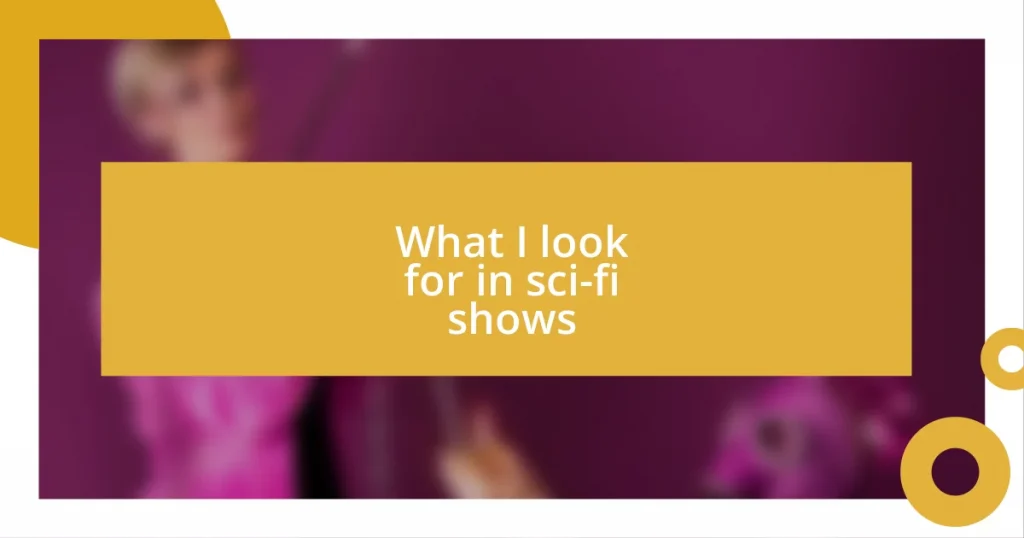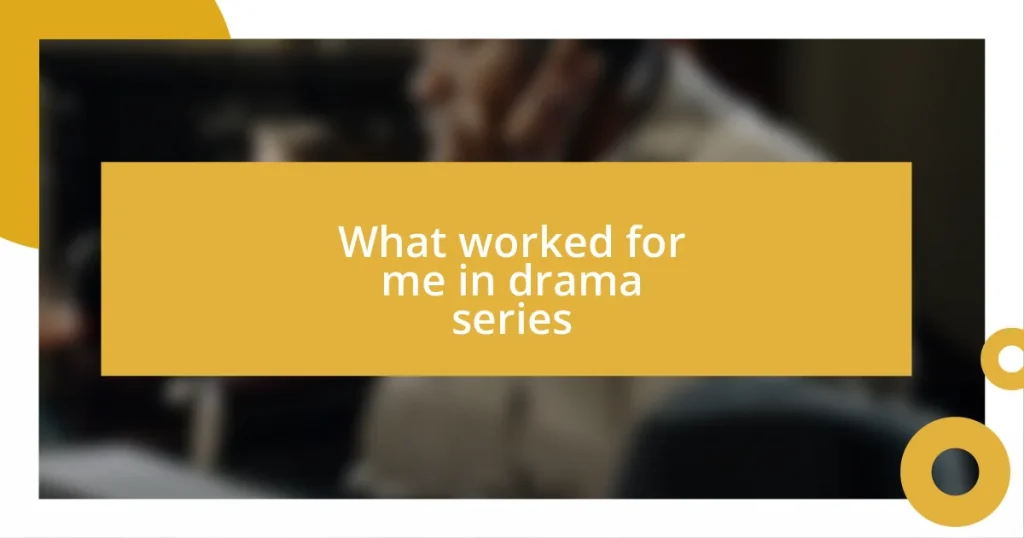Key takeaways:
- World-building is essential, providing immersive settings that challenge perceptions and enhance storytelling.
- Character development creates emotional connections, with relatable arcs and moral dilemmas that resonate with viewers.
- Innovative concepts and strong storytelling evoke reflections on ethics and human experience, pushing viewers to engage deeply with the narrative.
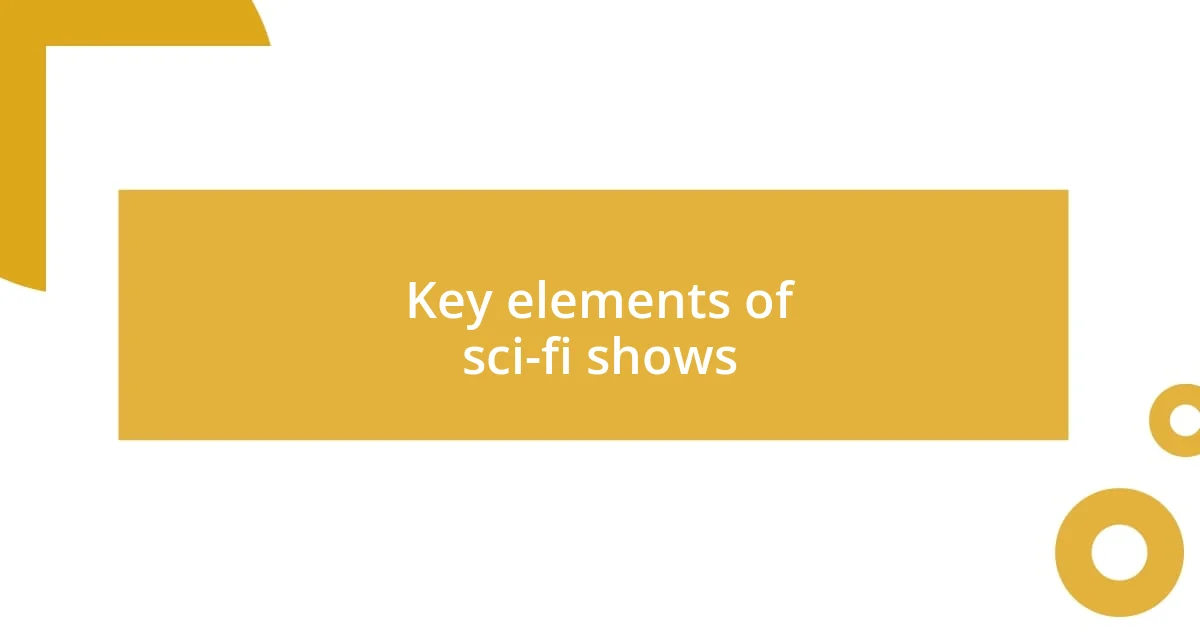
Key elements of sci-fi shows
When I think about the key elements of sci-fi shows, world-building stands out as the foundation. The intricate detail in creating new societies, complete with their own cultures, technology, and rules, truly captivates me. I’ve always been fascinated by how a well-crafted universe allows me to step into not just different realities but different ways of thinking.
Character development is another essential aspect that can make or break a sci-fi series. I often reflect on my favorite characters and how their personal journeys intertwine with the larger narrative. For instance, when a character grapples with the consequences of advanced technology, it prompts me to ask – how would I handle such power? Their struggles and triumphs resonate emotionally, drawing me deeper into the story.
Lastly, the moral and philosophical questions often posed in sci-fi are what keep me coming back for more. These narratives push boundaries and challenge our understanding of humanity. I remember watching a show that explored artificial intelligence and the implications of consciousness; it left me pondering what it truly means to be “alive.” Doesn’t that spark an enriching conversation about ethics and existence?
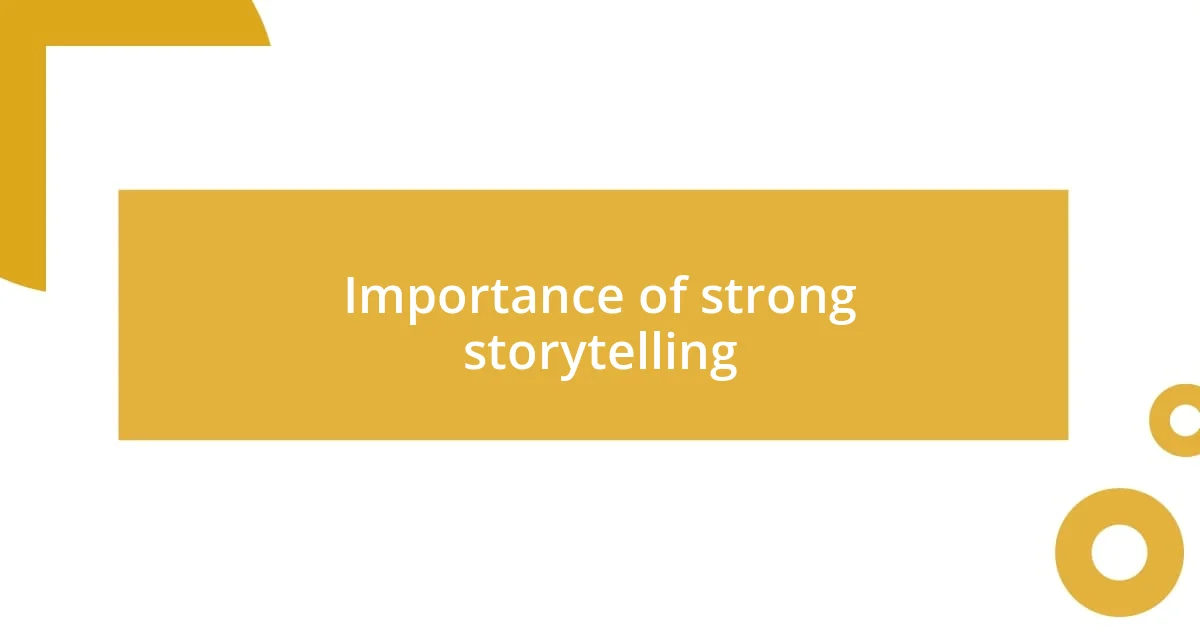
Importance of strong storytelling
Strong storytelling is the heartbeat of any compelling sci-fi show. I’ve often found that when the narrative flows seamlessly, it draws me into the universe, igniting my imagination. For example, I recall getting lost in a series where every twist and turn felt carefully crafted, making me question what I thought I understood about the plot and its characters. It’s that kind of storytelling that resonates with me long after the credits roll.
In my experience, engaging storytelling goes beyond mere entertainment; it has the power to evoke profound emotions. A series that masterfully creates tension and resolution can elevate the viewing experience. I’ll never forget how a particular show left me on the edge of my seat, investing me emotionally in its characters’ fates. That connection was electric, turning my appetite for the next episode into an all-consuming obsession.
Moreover, strong storytelling allows for rich thematic exploration, helping me untangle complex ideas that are often intertwined with the narrative. Reflecting on a past favorite, I enjoyed how the layering of personal stories against a backdrop of cosmic events made me question my own beliefs. Doesn’t that make you reflect on your views as well? The layers of storytelling transform a simple premise into a dialogue about life, morality, and everything in between.
| Element | Impact |
|---|---|
| Engagement | Captivates viewers and fosters emotional connections |
| Tension & Resolution | Creates anticipation and investment in the storyline |
| Thematic Depth | Encourages viewers to reflect on complex ideas |
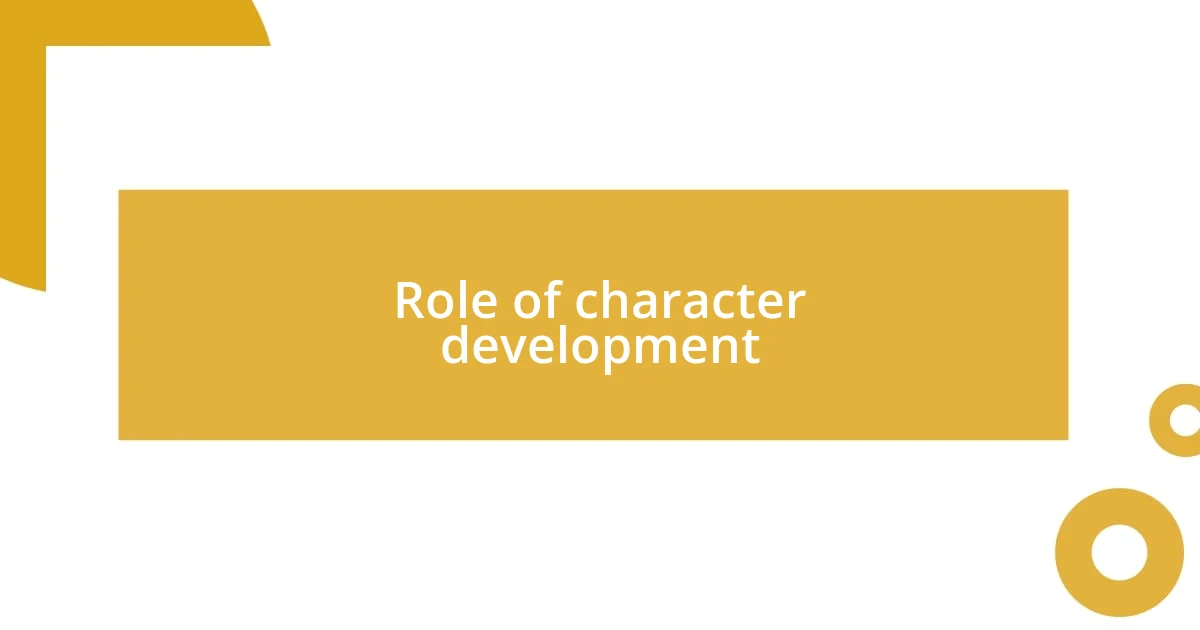
Role of character development
Character development in sci-fi shows is what keeps me emotionally invested. I remember watching a series where I witnessed the protagonist’s growth from being naive to grappling with the weight of their choices. That moment when they faced the ultimate consequence of their actions hit me hard; it was like a reflection of real life, even in an otherworldly setting. The relatability of their journey made me cheer for them while also pondering my own decisions.
Here are some key elements that underscore the significance of character development in these shows:
- Emotional Depth: Characters with rich backstories create profound connections, making me empathize with their struggles.
- Growth Arcs: Watching a character evolve over time not only adds excitement but also mirrors our experiences, prompting self-reflection.
- Moral Dilemmas: Characters often face tough choices that resonate with real-world issues, pushing me to think critically about my values.
- Complex Relationships: The dynamics between characters can enhance the plot, adding layers that make the narrative feel more authentic.
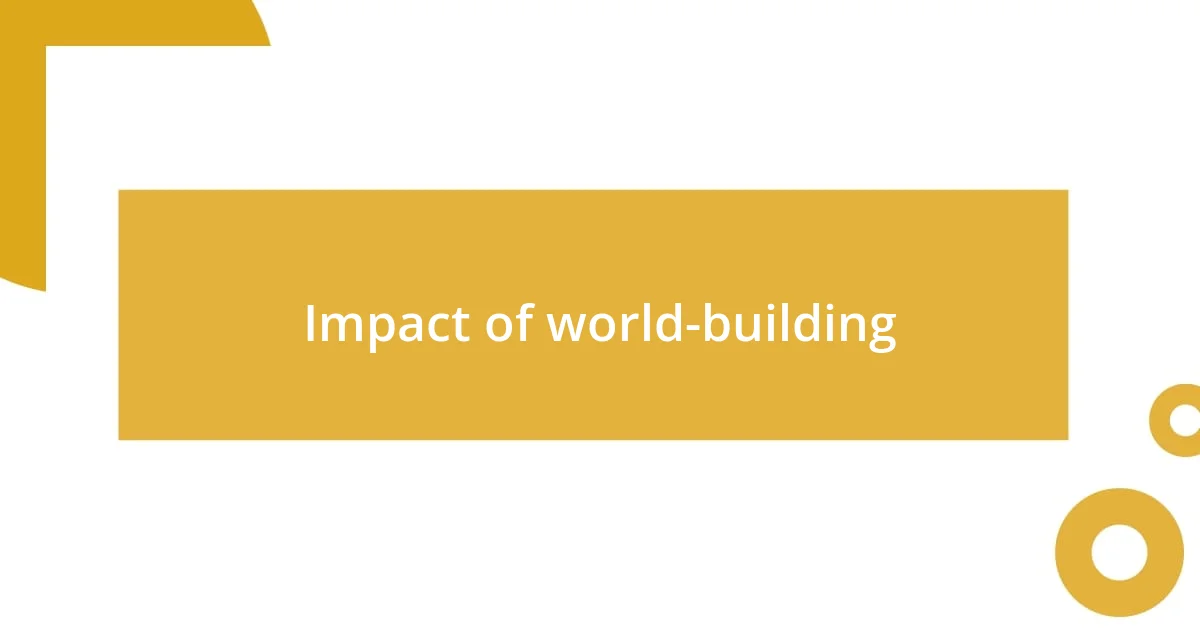
Impact of world-building
World-building is the DNA of any sci-fi universe, crafting an intricate tapestry that immerses me completely. I’ve seen shows where the boundaries of reality stretch, and it’s the meticulously designed worlds that invite me in. For instance, I remember a series with a dystopian backdrop featuring vibrant ecosystems existing alongside towering cities, which made me fantasize about living in such a paradoxical environment. It leaves me wondering: how do creators conjure such elaborate realms that feel both alien and oddly familiar?
When the world-building is robust, it allows for stories that feel expansive and limitless. I can’t help but get lost in the details—the languages, cultures, and histories that are woven together. I remember one show that introduced a civilization with its own unique trade practices and beliefs, sparking my curiosity about how our own societies are shaped. Have you ever found yourself reflecting on our world while exploring another? That’s the magic of well-crafted sci-fi settings; they mirror our reality and ignite deeper contemplation of who we are.
Additionally, I genuinely believe that good world-building enhances character motivations and actions. In a series I adored, characters were influenced by their surroundings—social structures dictated their choices and consequences. It felt like each move they made was deeply tied to the world’s rules, which made their journeys even more impactful. Isn’t it fascinating how a universe can shape destinies? It’s a reminder that in storytelling, the world itself can be as influential as the characters who inhabit it.
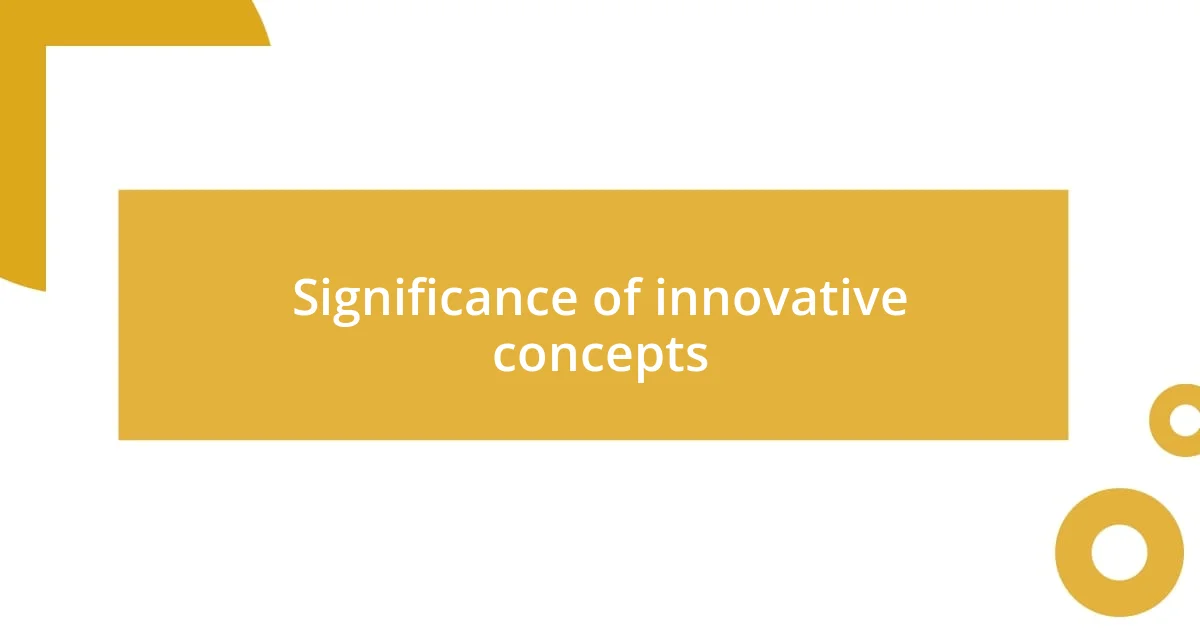
Significance of innovative concepts
Innovative concepts in sci-fi shows spark my imagination in ways I never expected. For me, it’s not just about technology or futuristic gadgets; it’s about how these ideas challenge the norms of our reality. I remember discovering a show that posed the question—what if time travel could alter destinies in ways we can’t foresee? It kept me on edge, pondering the consequences of our choices long after the credits rolled. Have you ever found yourself contemplating a ‘what if’ scenario that completely shifts your perspective?
The beauty of innovative concepts is their ability to inspire creativity and foster discussions around ethics and society. I once watched a series exploring artificial intelligence and its potential to develop emotions. This premise not only captivated my interest but made me think about the implications of our own advancements in technology. In reflecting on these ideas, I often wonder: how closely are we inching towards a future depicted in our favorite shows?
Additionally, innovative concepts can breathe life into familiar storylines, transforming them into something refreshingly new. Take, for example, a narrative that flips the traditional hero’s journey on its head—one where the antagonist’s perspective is front and center. Engaging with such a concept challenged my preconceived notions of good and evil. Isn’t it fascinating how a creative twist can alter our understanding of character motivations? Innovative storytelling can open doors to endless possibilities, making each viewing experience uniquely enriching.
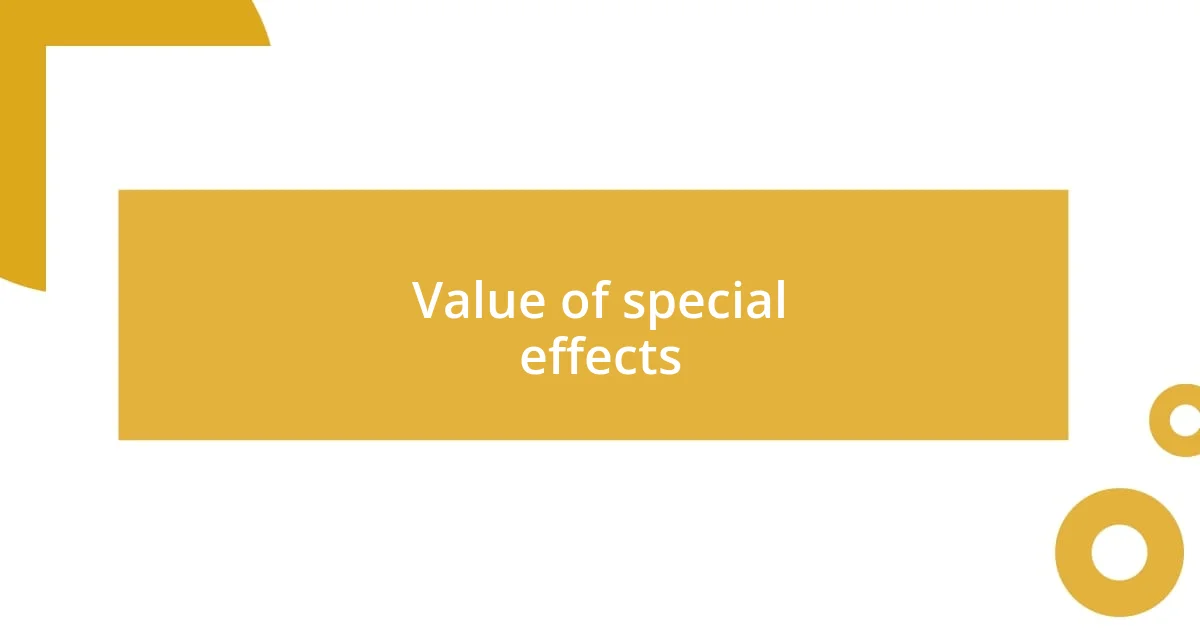
Value of special effects
The value of special effects in sci-fi shows can’t be overstated. They create a visual language that amplifies the story, making it feel more believable and immersive. I remember watching a series where the stunning visuals of intergalactic battles made my heart race—each explosion and swirling galaxy drew me deeper into the universe. Have you ever felt your pulse quicken while watching something that took your breath away?
On a more personal note, special effects can evoke genuine emotions, making scenes unforgettable. There’s a particular show that featured a scene with a breathtaking alien landscape, filled with bioluminescent plants that pulsated in sync with the characters’ emotions. It was a striking moment that brought tears to my eyes—not just because of the beauty, but because it captured the essence of connection in an alien world. Isn’t it incredible how visuals can unlock feelings we might not even realize are there?
Moreover, I find that well-executed special effects act as a bridge between fantastical elements and everyday life. For instance, when I see technology depicted in a way that feels almost tangible, it ignites my curiosity about real-world innovations. I once watched a series where a holographic interface was such a natural part of the characters’ lives that I couldn’t help but wonder: could we be that close to such advancements? The line between fiction and reality can feel razor-thin when the special effects are done right.
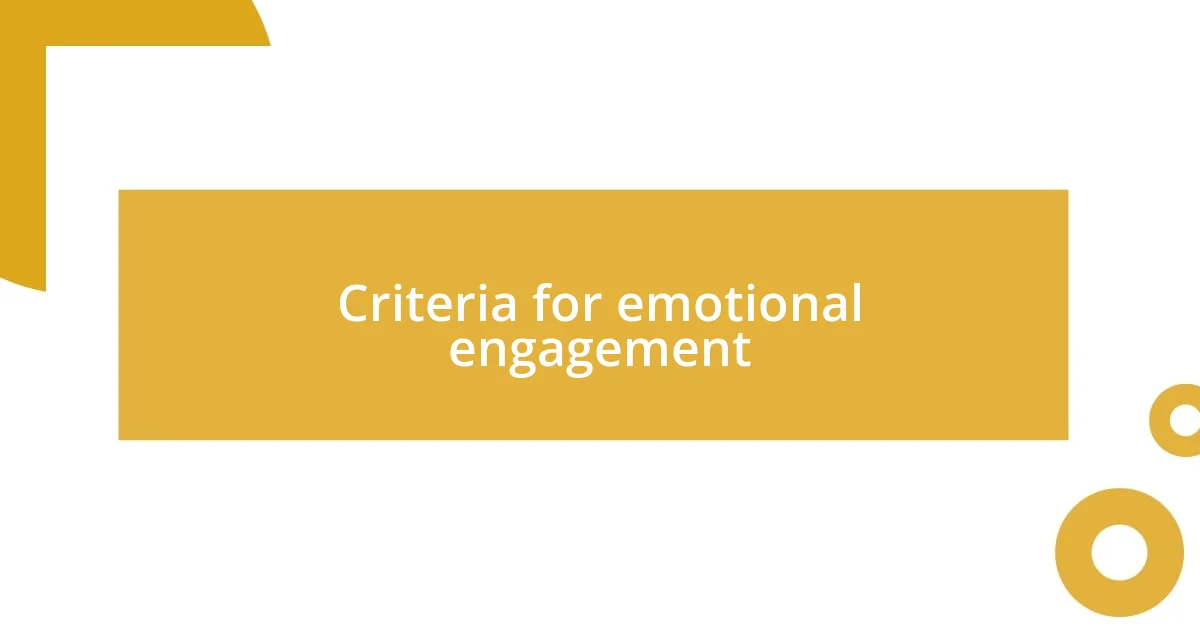
Criteria for emotional engagement
Feeling a strong emotional connection to characters is crucial for me when engaging with sci-fi shows. If I can see pieces of myself in their struggles, it makes the journey more relatable and impactful. I once watched a series that showcased a character grappling with isolation on a distant planet, and it truly struck a chord with me. Have you ever had a moment where a fictional character’s pain felt almost like your own? That ability to connect can turn a simple storyline into an unforgettable experience.
Another key factor is character development. I’ve found that well-defined arcs, where characters evolve based on their experiences, create a deeper emotional landscape. One series featured a protagonist who started as a misanthrope but gradually learned to trust others while navigating a post-apocalyptic world. I was invested in their journey, rooting for their growth every step of the way. How can we not empathize with someone striving to break free from their own barriers? That kind of transformation resonates deeply.
Finally, the emotional stakes of a story can sweep me off my feet, especially when the tension is palpable. I recall a heart-wrenching episode where a beloved character faced a choice between their mission and a loved one’s life. The weight of that decision left me breathless, forcing me to ask myself what I would choose in a similar situation. Isn’t it amazing how a single moment in a story can hold such power over our emotions? The best sci-fi shows understand this dynamic, crafting moments that linger in my thoughts long after the credits roll.










